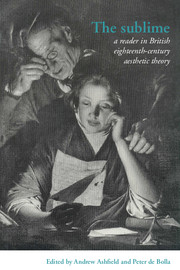Book contents
- Frontmatter
- Contents
- List of Abbreviations
- Introduction
- Part I The Longinian tradition
- Part II Rhapsody to rhetoric
- Part III Irish Perspectives
- Part IV The Aberdonian Enlightenment
- 28 An enquiry into the life and writings of Homer (1735)
- 29 Theodorus: a dialogue concerning the art of preaching (1752)
- 30 An essay on taste (1759)
- 31 An essay on original genius (1767)
- 32 Essays on the intellectual powers of man (1785)
- 33 Dissertations moral and critical (1783)
- Part V Edinburgh and Glasgow
- Part VI From the Picturesque to the Political
- Sources and further reading
29 - Theodorus: a dialogue concerning the art of preaching (1752)
Published online by Cambridge University Press: 05 June 2012
- Frontmatter
- Contents
- List of Abbreviations
- Introduction
- Part I The Longinian tradition
- Part II Rhapsody to rhetoric
- Part III Irish Perspectives
- Part IV The Aberdonian Enlightenment
- 28 An enquiry into the life and writings of Homer (1735)
- 29 Theodorus: a dialogue concerning the art of preaching (1752)
- 30 An essay on taste (1759)
- 31 An essay on original genius (1767)
- 32 Essays on the intellectual powers of man (1785)
- 33 Dissertations moral and critical (1783)
- Part V Edinburgh and Glasgow
- Part VI From the Picturesque to the Political
- Sources and further reading
Summary
I am conscious to myself of no prejudices against our modern preachers, said Agoretes, and am very willing to allow them all the merit that you or their warmest advocates can plead for. I allow them generally a noble superiority to popular errors, great freedom and beauty of sentiment, clear reasoning and coherence of thought, deep critical skill, elegance of style, a just arrangement of periods, propriety of pronunciation, and much modesty in their action and manner. But after all, I have so unhappy a taste, or so unfashionable way of thinking, as not to be thoroughly satisfied even with all these combined excellencies. I want, my dear friend, to have my mind exalted above the world, and above itself, with the sacredness of divine things: I want to feel, warmly to feel, no less than to be coolly convinced of, the transcendant beauty, and excellence of virtue: I want to be suspended, and awed, as with the presence of God, to sink into deep prostration before Him, to be struck with the majesty of his perfections, and transported with the wonders of his love; I want to conceive an infinite horror at sin, to glow with an ardent passion for doing good, to pant after perfection and immortality, and to ripen apace for both: In short, I want to have my understanding enlightened, my heart inflamed, every affection thrilled, and my whole life reformed.
- Type
- Chapter
- Information
- The SublimeA Reader in British Eighteenth-Century Aesthetic Theory, pp. 166 - 167Publisher: Cambridge University PressPrint publication year: 1996

